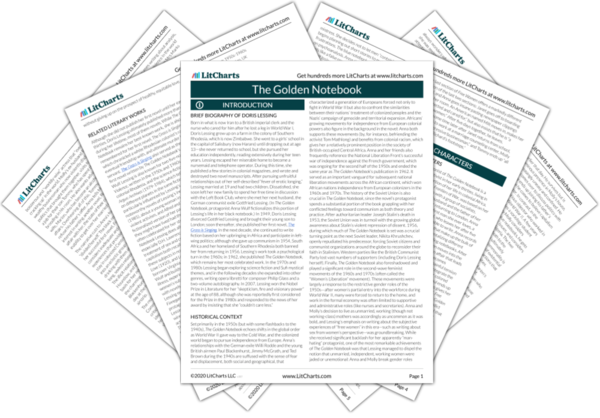Willi Rodde Quotes in The Golden Notebook
George said: “No, it’s the responsibility. It’s the gap between what I believe in and what I do.”
“It seems to me like this. It’s not a terrible thing — I mean, it may be terrible, but it’s not damaging, it’s not poisoning, to do without something one wants. It’s not bad to say: My work is not what I really want, I’m capable of doing something bigger. Or I’m a person who needs love, and I’m doing without it. What’s terrible is to pretend that the second-rate is first-rate. To pretend that you don’t need love when you do; or you like your work when you know quite well you’re capable of better. It would be very bad if I said, out of guilt or something: I loved Janet’s father, when I know quite well I didn’t. Or for your mother to say: I loved Richard. Or I’m doing work I love …”
Then I remembered that when I read my notebooks I didn’t recognize myself. Something strange happens when one writes about oneself. That is, one’s self direct, not one’s self projected. The result is cold, pitiless, judging. […] If Saul said, about his diaries, or, summing his younger self up from his later self: I was a swine, the way I treated women. Or: I’m right to treat women the way I do. Or: I’m simply writing a record of what happened, I’m not making moral judgements about myself — well, whatever he said, it would be irrelevant. Because what is left out of his diaries is vitality, life, charm. “Willi allowed his spectacles to glitter across the room and said …” “Saul, standing foursquare and solid, grinning slightly — grinning derisively at his own seducer’s pose, drawled: Come’n baby, let’s fuck, I like your style.” I went on reading entries, first appalled by the cold ruthlessness of them; then translating them, from knowing Saul, into life. So I found myself continually shifting mood, from anger, a woman’s anger, into the delight one feels at whatever is alive, the delight of recognition.

Willi Rodde Quotes in The Golden Notebook
George said: “No, it’s the responsibility. It’s the gap between what I believe in and what I do.”
“It seems to me like this. It’s not a terrible thing — I mean, it may be terrible, but it’s not damaging, it’s not poisoning, to do without something one wants. It’s not bad to say: My work is not what I really want, I’m capable of doing something bigger. Or I’m a person who needs love, and I’m doing without it. What’s terrible is to pretend that the second-rate is first-rate. To pretend that you don’t need love when you do; or you like your work when you know quite well you’re capable of better. It would be very bad if I said, out of guilt or something: I loved Janet’s father, when I know quite well I didn’t. Or for your mother to say: I loved Richard. Or I’m doing work I love …”
Then I remembered that when I read my notebooks I didn’t recognize myself. Something strange happens when one writes about oneself. That is, one’s self direct, not one’s self projected. The result is cold, pitiless, judging. […] If Saul said, about his diaries, or, summing his younger self up from his later self: I was a swine, the way I treated women. Or: I’m right to treat women the way I do. Or: I’m simply writing a record of what happened, I’m not making moral judgements about myself — well, whatever he said, it would be irrelevant. Because what is left out of his diaries is vitality, life, charm. “Willi allowed his spectacles to glitter across the room and said …” “Saul, standing foursquare and solid, grinning slightly — grinning derisively at his own seducer’s pose, drawled: Come’n baby, let’s fuck, I like your style.” I went on reading entries, first appalled by the cold ruthlessness of them; then translating them, from knowing Saul, into life. So I found myself continually shifting mood, from anger, a woman’s anger, into the delight one feels at whatever is alive, the delight of recognition.











